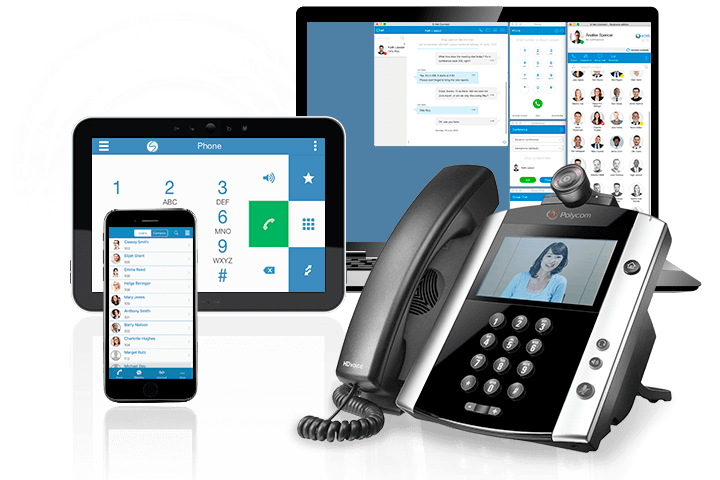Many firms’ communication strategies rely on voice over Internet Protocol (VOIP) phone systems. Businesses can save money by making and receiving calls over the internet, and they can stay in touch no matter where they are.
This is only achievable with advanced technology, which is why many experts consider VOIP to be important to a company’s future success.
VOIP services have various advantages; yet despite being a common mode of communication, the technology is continually evolving.
What Is a VOIP phone?
Any phone that makes and receives calls via the internet is referred to as a VOIP phone. VOIP phones give you more mobility, interoperability, and connectivity than a standard “hard wired” phone, which uses direct connect copper cables to offer a telephone service.
Between VOIP phones and regular phones, there are two significant differences. The first is that a VOIP phone will work regardless of your location. You can make and receive calls from anywhere as long as you have access to the internet. The second distinction is that you don’t necessarily need a phone to make calls. An app on your computer can be used to make a call.
Check out CallHippo and CircleLoop for examples of VOIP phone providers.
Why Would Someone Use a VOIP Phone?
Here are six ways VOIP can improve your company phone service dramatically:
It Is Less Expensive than Using a Standard Landline Phone
If you already have an internet connection at home, VOIP installation and use may be far less expensive than you think. VOIP telephone providers don’t have to install expensive phone lines because voice calls flow over the internet. This saves them a ton of cash, which they can pass along to you in the shape of lower phone plans.
Additionally, VOIP lowers the cost of individual calls and, in many circumstances, eliminates them entirely. VOIP phone calls, like the internet itself, have no geographical boundaries. As a result, VOIP essentially ignores the concepts of local, long-distance, and international phone calls, allowing you to make low-cost calls to anyone in the world.
If you have friends or relatives who live abroad, this can save you a lot of money on previously high call fees.
It’s Simple to Set up and Maintain
The ease with which VOIP technology may be installed is a game-changer. Unlike traditional phone lines, which necessitate the time and expense of physical installation, VOIP does not rely on the hardware that comes with the standard PSTN (public switched telephone network).
You also don’t need to be a tech whiz to set up VOIP. It operates on a plug-and-play basis and can be readily configured using a line that connects to your computer and a power source. Calls can be made using a low-cost headset, a loudspeaker, or a VOIP phone handset. You can also use a mobile phone app to make calls using the same VOIP number if you want.
Updates to your VOIP service are as simple to carry out as the initial setup. These updates can be downloaded with a single click of a button, without any additional software or hardware. VOIP’s reliance on broadband internet gives an environmentally beneficial option that we should all be aware of in today’s world.
You Can Use It Wherever You Go
Putting your house phone handset in your luggage and using it to make calls somewhere else would have been the stuff of cartoon slapstick years ago. However, it is now a reality and a very useful one at that. You’ll always have a phone with you, whether you’re using a VOIP smartphone app or a cheap plug-and-play phone.
This allows customers to use their phones when they are away from home while keeping the same phone number. If you’re on the road, you can even bring a headset with you to stay connected.
It Comes with a Range of Useful Extra Features
The amount of add-on technology that comes with VOIP in comparison to traditional phone systems is a big functional advantage. Since VOIP phones receive data in different ways, they can offer a variety of added services.
Many VOIP phone services include features that would cost extra – or would have been impossible – with traditional phone system providers as part of their regular bundle.
Call forwarding, three-way calling, caller ID, and electronic and video messaging are just a few of the features available.
It Makes Relocating a Breeze
Contacting the provider to transfer phone lines is a necessary but time-consuming task for customers with traditional phone service who are moving to a new home. This process is eliminated with VOIP because your service is not tied to a specific line, device, or residence.
A VOIP phone is unplugged from the modem and relocated to your new house in the same way that a phone is unplugged from the modem when traveling – all while retaining the same phone number and account.
It Will Only Get Bigger and Better from Here
Similarly to how VOIP has propelled enterprises to the forefront of cutting-edge telecom technology, more people are realizing that VOIP is the future of all telephone communication.
The classic PSTN has effectively become a legacy product as superior technologies become available, and telephone providers have already begun to cut their investment in the old technology. VOIP is becoming a common part of the house and will continue to do so, whether due to consumer preference or market availability.
With 5G mobile set to revolutionize ultra-fast mobile internet, the potential for VOIP is set to expand even further. Companies are investing less and less in copper-wire phone connections, which is causing many households to upgrade.
VOIP Phone Features
Here are 5 VOIP services that many providers offer and will benefit small and medium businesses:
- Call Forwarding/Voicemail
Many small enterprises simply cannot work around the clock. This means that you or your employees will be unable to answer the phone at times. The ability to convert phone communications into emails is available from most industry-leading VOIP providers, which could be quite beneficial to your company.
- DND (Do Not Disturb)
As for individuals who work with clients regularly, DND (Do Not Disturb) is a vital function. When you’re speaking with a customer, the last thing you want to do is be interrupted by a phone call because it makes you appear unprofessional.
- Conferences
You can almost certainly count on having to conduct a conference call at some point. This type of call may be made on a regular basis by some managers and owners. The best VOIP systems allow users to communicate files, chat messages, collaborate on calendars, exchange presentations, and even share desktops in addition to conference calls. Many vendors refer to this as Unified Communications.
- Auto Attendant
This feature expands your company’s reach by allowing you to set up multiple numbers in different areas and create a menu system, similar to what many large corporations do. This implies you can set up a system in which a caller can quickly connect with several departments or even a live operator.
- Call Recording
You may be required to record calls if your company is in a regulated industry. Alternatively, you might want to record calls in order to keep track of customer satisfaction and inquiries. Regardless of your requirements, a decent VOIP system will enable you to record calls quickly and efficiently, frequently with the click of a mouse, and store them in an audio format that can be conveniently replayed later.
VOIP Phone Benefits
Here’s a rundown of VOIP’s benefits:
- Lower costs
- More accessibility
- Potability
- Increased scalability
- Advanced features
- High voice quality
- Encourages multitasking
- More flexibility
Do You Need a Special Phone for VOIP Calls?
The major benefit of VOIP is that it does not require the use of a unique phone or device in order to take advantage of its features.
Everything you need, such as adaptability, flexibility, and cost-effectiveness, is there at your fingertips.
Of course, if you want to upgrade to a more advanced handset or even a headset, you’ll get more user-friendly features like customizable keys and call recording, as well as cordless choices.
The main issue, though, is call quality, which is mostly determined by the structure of your broadband connection. More service providers are converting to a broadband-by-default model with VOIP as an option. As a result, these services come with platforms that incorporate extra VOIP features that are useful.
VOIP Phone Costs
Essentially, a good phone system is necessary for a business to succeed; however, traditional systems are pricey.
A VOIP phone system, on the other hand, can save you a lot of money. Depending on the system technology and setup, VOIP systems can cost as little as £20 per line.
Businesses considering switching to VOIP services may be wondering why VOIP is less expensive than a landline.
The short answer is that VOIP is less expensive than a landline because it relies on a preexisting internet server rather than a separate system or technology. VOIP is less expensive than a traditional phone line.
If you’re looking for a VOIP phone system provider that also offers CRM systems, check out Nextiva.
If this VOIP Phone guide helped you, please recommend DigitalSupermarket.





